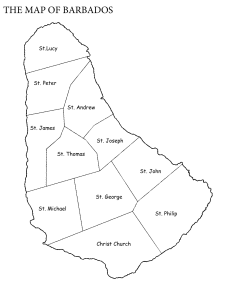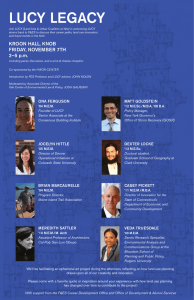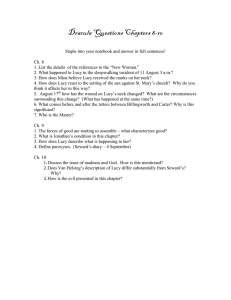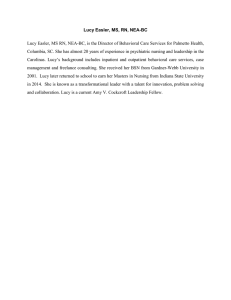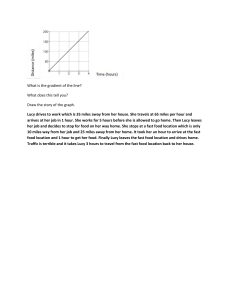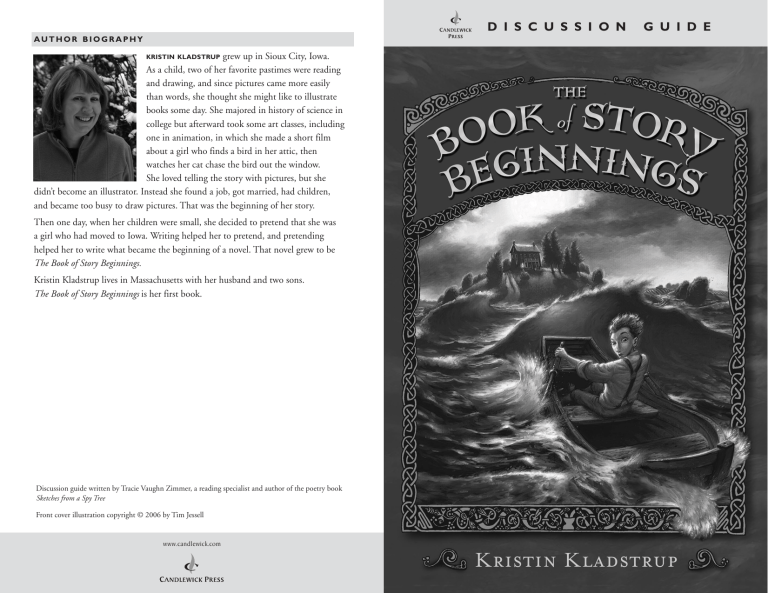
D I S C U S S I O N AUTHOR BIOGRAPHY KRISTIN KLADSTRUP grew up in Sioux City, Iowa. As a child, two of her favorite pastimes were reading and drawing, and since pictures came more easily than words, she thought she might like to illustrate books some day. She majored in history of science in college but afterward took some art classes, including one in animation, in which she made a short film about a girl who finds a bird in her attic, then watches her cat chase the bird out the window. She loved telling the story with pictures, but she didn’t become an illustrator. Instead she found a job, got married, had children, and became too busy to draw pictures. That was the beginning of her story. Then one day, when her children were small, she decided to pretend that she was a girl who had moved to Iowa. Writing helped her to pretend, and pretending helped her to write what became the beginning of a novel. That novel grew to be The Book of Story Beginnings. Kristin Kladstrup lives in Massachusetts with her husband and two sons. The Book of Story Beginnings is her first book. ˇ Í È Í Discussion guide written by Tracie Vaughn Zimmer, a reading specialist and author of the poetry book Sketches from a Spy Tree Front cover illustration copyright © 2006 by Tim Jessell www.candlewick.com G U I D E SYNOPSIS DISCUSSION POINTS Oscar Martin was fourteen when he disappeared from his Iowa farmhouse one Before reading: night in June 1914. His sister Lavonne claimed she saw Oscar row out to sea — 1. The Book of Story Beginnings is a fantasy novel. How is reading a fantasy different from reading a work of historical fiction? How can you avoid confusing the two types of books? but in landlocked Iowa, how could that be possible? Nearly a century later, Lucy Martin and her parents inherit that same farmhouse from Lavonne, Lucy’s great-aunt. In her last letter to Lucy’s father, Lavonne 2. What do you think the title means? How do stories begin? What elements do all stories have in common? wrote of a dream in which Oscar told her,“Lucy will explain!” Can Lucy really unravel the mystery of what happened to Oscar? When she and her parents move to the farmhouse (known as The Brick) from their city apartment, it’s not long before Lucy discovers the strange and dangerous Book of Story Beginnings. And it’s not long before Oscar reappears, and he and Lucy become characters in a story that sends them on a perilous journey to save Lucy’s father.The distant relatives encounter a ship full of orphans and a king and queen at odds with each other, as together they try to resolve their story and close the Book of Story Beginnings. Setting: 1. Compare and contrast Lucy’s life at The Brick with her life back east in a city apartment. What does she like about her old home? What excites her about her new one? Which place would you rather live? Why? 2. At what point in time does the novel open? Why? In chapter one, the time period switches. How do you know? What specific clues did you use to make this connection? Why are both settings critical to explain Lucy’s story? 3. Describe Cat’n’berd Island. Who are the inhabitants? What are they like? Why is this island an important setting in the book? 4. How is time different on Cat’n’berd Island from the way it is at The Brick? What could that mean to Oscar, Lucy, and her father? How do they realize that time runs differently? 5. How do you think Oscar feels about living in the future? What does he like? What amazes him? What doesn’t he like? What do you think would be the most fascinating aspect of living in the future? What do you think life will be like a century from now? What historical events do you think will have transpired? Characters: 1. Even though Aunt Lavonne has already died at the opening of the book, she is an important character in the story. Describe Aunt Lavonne and her quest for knowledge. How does her example inspire both Lucy and her father? What do you think she would say about what they learned? 2. Compare the three different families in the novel—Oscar’s, Lucy’s, and the King and Queen on the island. How are the families alike? How are they different? How do things ultimately turn out for each of them? Do any of the families change over the course of the story? If so, how? 3. “It struck Lucy that Oscar sounded like a hero” (p. 113). Why? What characteristics make someone a hero in a story? What about in real life? How is Oscar a hero? Does Lucy also share these qualities? CANDLEWICK PRESS DISCUSSION GUIDE – THE BOOK OF STORY BEGINNINGS 4. This fantasy novel is packed with a unique cast of minor characters including the King of Cats, the Queen of Birds, Captain Mack, the shipful of orphans (including Millie), and the King’s familiar, Tom. Describe each of these characters and how they are important to the story. How does each character affect Lucy’s attempt to rescue her father? 6. There are several stories that intertwine in The Book of Story Beginnings. What are the beginning, middle, and end of each of these stories? How do they interact with one another? 5. What six adjectives would you use to describe Lucy? What actions on her part make you choose these descriptors? What does Lucy learn through her adventure? How has she changed by the end of the novel? Need an after-school activity? Baseball practice rained out? Try one of these projects based on the book just for fun. After you’re done, you might share it with a friend, librarian, teacher, or your book club. 6. “It’s just a story, [Lucy] reminded herself. A story with characters who could surprise you, who could catch you off guard. Anything could happen in a story” (p. 299). Which characters surprised you most in this story? What caught you off guard? How do readers get to know the characters of a story? Writing: 7. On page 359, Lucy says of the King and Queen: “It helps to have something in common, but she [Phoebe] can’t be everything for them. They need to choose to be happy.” Do you think people can “choose to be happy”? If so, do you think Oscar will? Do you think Lucy’s parents will? Themes: 1. Discuss the element of magic in the story. What magical objects make the story possible? Would you rather have the transformation potion or the traveling talisman? Why? What would you become, or where would you go? What would you do with this magic? 2. Why does Lucy decide to follow the path the moon makes on the sea? What must she do? Would you be willing to risk your life and be stuck in another form or time for a member of your family? Who? Is Lucy, then, a hero too? 3. On page 358, Oscar asks Lucy, “When you put certain books back on the shelf, don’t you feel as if the people inside are going on with their lives after the story is over?” Why do some books have this effect while others do not? How do authors make stories that are so memorable they live on like this? Which books do you still think about? Will you be thinking about Lucy and Oscar? 4. Where do you think the magical Book of Story Beginnings came from? What do you think its future will be? How did it change everything? 5. On page 361, Lucy says to Oscar, “The happiest endings—I think they’re endings that feel like beginnings.” What does she mean by this? What beginning is at the ending of this book? Predict what you think Oscar and Lucy will be like when they are grown up. What makes you think this? PROJECTS Imagine that you have found the Book of Story Beginnings. As Oscar and Lucy did, begin your own tale. Will it be a fairy tale? An adventure story? Set in a different time? You make the choices! See what happens. . . . Maybe yours will come to life too. Art: Using recyclable materials, create a three-dimensional piece of art based on one of the settings from the book. There are many to choose from but here are a few: Lucy’s city neighborhood, The Brick, Cat’n’berd Island, or the ship of orphans. Math: Time moves differently on Cat’n’berd Island from the way it does in Iowa. Can you calculate Oscar’s and Lucy’s if they were stuck there for different amounts of time? Can you create a chart or graph that explains how time works on the island compared to home? A N I N T E RV I E W W I T H K R I S T I N K L A D S T R U P Q. What was the original inspiration for the book? A. I tend to have lots of fragmented story ideas that accumulate in my head over time: a girl who moves to Iowa and finds a rowboat in an old shed, an ocean in Iowa, a king who loves cats, and queen who loves birds. I’m like Oscar in that I usually have nothing more than ideas, so a book that turns ideas into stories was very appealing to me! Q. In the book you make several references to children’s classics. Are these the books that influenced you most as a reader and writer? What other books inspire you? A. I read all the time when I was young. Luckily I was very tall and had long arms to carry tall stacks of books out of the library! E. Nesbit, Eleanor Estes, Elizabeth CANDLEWICK PRESS DISCUSSION GUIDE – THE BOOK OF STORY BEGINNINGS Enright, and C. S. Lewis were some of the writers I loved. Like Lucy, I have read The Lion, the Witch, and the Wardrobe many times. And Treasure Island, which is also mentioned in The Book of Story Beginnings, seemed like an adventure story that Oscar would love, which is why it’s the inspiration for him to write his fateful story beginning. Q. What have you learned about writing (and maybe about yourself ) while completing this project? What advice would you give young writers? A. One surprising thing I learned was that I don’t need to know exactly where a story will go when I start writing it. Another thing I learned was the importance of forging ahead. I like to revise better than I like to write, so it’s always tempting to fix up what I’ve already written instead of writing the next chapter. My advice to young writers is to trust your ideas and write them down. You may be able to turn them into a story if you push yourself. Q. On page 70, Lucy’s father says, “The imagination has a potential for bringing about a transformation. And that potential is capable of being activated by language.” Do you think this is true in our everyday lives? How did you develop such an active imagination? A. I don’t know whether what Lucy’s father says is true in everyday life, but I think it is true about stories. My own imagination isn’t particularly active unless I’m trying to use words to transform my vague ideas into a scene for a story. Even a rough draft has the power to make me imagine the scene. And the scene becomes even more vivid when I come back and revise. It’s remarkable to me that the words I organize into a story can also activate a reader’s imagination. Q. Your readers will be clamoring for another book from you! What are you working on next? Can you share enough to hold us over? OT H E R B O O K S TO C O M PA R E A N D C O N T R A S T • The Dragon of Lonely Island by Rebecca Rupp (Candlewick Press, 1998) While spending the summer at their great aunt Mehitabel’s house on faraway Lonely Island, Hannah, Zachary, and Sarah Emily discover a glittering three-headed golden dragon with a kind heart, an unpredictable temper, and a memory that spans 20,000 years. • The Return of the Dragon by Rebecca Rupp (Candlewick Press, 2005) Hannah, Zachary, and Sarah Emily find further intrigue on the tiny Maine island where their talkative three-headed dragon friend hopes to peacefully lives out its days. But is Fafnyr’s hiding place safe? • A Wrinkle in Time by Madeleine L’Engle (Farrar, Straus & Giroux, 1962) Meg, Charles Wallace, and Calvin O’Keefe embark on a series of adventures in space and time as they search for Meg’s father, a scientist who disappeared while engaged in secret government research. • Island of the Aunts by Eva Ibbotson (Dutton, 2000) As they get older, several sisters decide that they must kidnap children and bring them to their secluded island home to help with the work of caring for an assortment of unusual sea creatures. • Inkheart by Cornelia Funke (Scholastic, 2003) Twelve-year-old Meggie learns that her father, who repairs and binds books for a living, can “read” fictional characters to life when one of those characters abducts them and tries to force him into service. • The Chronicles of Narnia by C. S. Lewis (Harper Trophy, boxed edition, 1994) Narnia is the fictional setting for seven books written by C. S. Lewis featuring a lion king and many different children who are magically transported to this land. A. I’m writing a sequel to The Book of Story Beginnings, partly because I want to write more about Lucy and Oscar and partly because several new characters have been kicking about in my mind. Also, I really want to find out more about the magic Book of Story Beginnings. Where did it come from? What happens to the stories it invents after the stories are finished? What about all of those blank pages that are still waiting for more stories? CANDLEWICK PRESS DISCUSSION GUIDE – THE BOOK OF STORY BEGINNINGS
